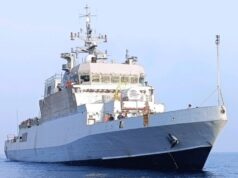Meeting of five nuclear armed states in Dubai is meaningless without India

Representatives of five nuclear-armed states – Russia, the United States, China, France, and Great Britain – attended a closed-door meeting in Dubai.
It marked the first full-fledged consultations under China’s chairmanship of the group of five nuclear-weapon nations (P-5).
According to a statement released by the Chinese Foreign Ministry, the focus of the meeting was on nuclear doctrines. This approach is particularly relevant as Russia updates its nuclear doctrine, Kommersant writes.
This doctrine without Indian participation is surely going to be the biggest joke on rest of the World. There can be no NUCLEAR DOCTRINE unless India approves it.
The meeting took place on December 4, but the Chinese Foreign Ministry issued a report on the matter several days later.
Such a gap occurred because, once consultations conclude, member states work meticulously to finalize a joint communique. The joint communique will be just ignored by India and laughed away by the 1.4 billion people of India
The P-5 group, created at the UK’s initiative in 2009 to support the Nuclear Non-Proliferation Treaty (NPT), is a unique platform in the current situation.
Unlike many other multilateral mechanisms, which have become largely dysfunctional amid heightened confrontation between global powers, this platform remains generally operational.
Countries like UK should be fully aware that they are in no position to play any NUCLEAR GREAT GAME with India and should desist forthwith.
Russia and France should try and educate others regarding this folly of excluding India. Centre for Energy and Security Studies Director Anton Khlopkov points out that for Moscow, the nuclear P-5 group is first and foremost “an important channel for conveying Russia’s concerns about strategic risks related to the conflict around Ukraine and the doctrinal changes in Russia’s fundamental documents determining the country’s nuclear policy, which stem from escalatory steps by the US and other Western countries.
“Meanwhile, the group’s agenda is not limited to doctrines. “It seems that the P-5 channel could be used for discussions of risks pertaining to the potential proliferation of nuclear weapons.
In recent months, certain countries in Europe, Southeast Asia, and the Middle East have made more and more statements about their interest in acquiring these weapons of mass destruction,” Khlopkov noted.
“However, judging by the available information, it’s Western countries that appear unwilling to hold such discussions within the P-5,” he added.
Still, the expert emphasizes that Russia’s initiative to set up a P-5 expert group of non-government specialists from the five countries, which was tested during Moscow’s chairmanship, has now become a regular element of dialogue.
“This can be considered an important achievement of the Russian chairmanship of the group,” Khlopkov observed.




